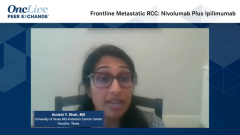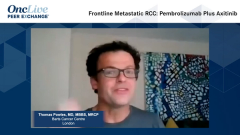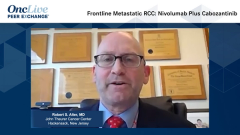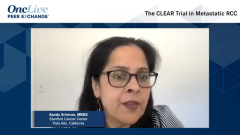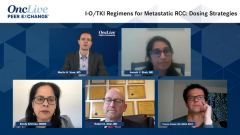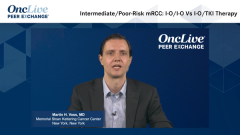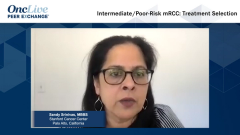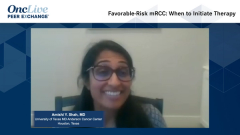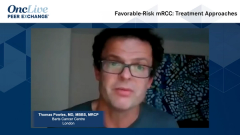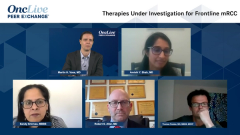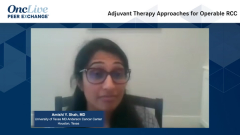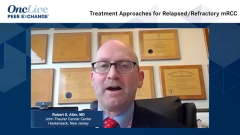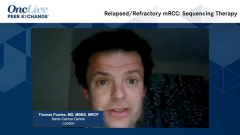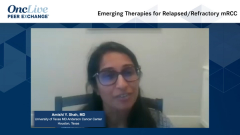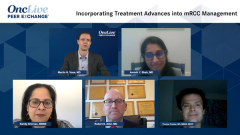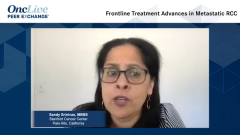
Frontline Metastatic RCC: Nivolumab Plus Ipilimumab
Amishi Y. Shah, MD, comments on the significance of updated survival data revealed by the CheckMate 214 study using the combination of ipilimumab plus nivolumab as frontline therapy for metastatic renal cell carcinoma.
Episodes in this series

Martin H. Voss, MD: This might be a good segue for us to start to talk about clinical trial data. It would be helpful to dive into the data for some of the pivotal trials that have redefined our practice and shaped the path from monotherapy to considering immuno-oncology–based combinations for most of our patients. Dr. Srinivas mentioned the CheckMate 214 study: the pivotal registration trial for ipilimumab/nivolumab. Amishi, can you speak a little to the overall design of this study and the key efficacy findings? We’ve now seen this regimen analyzed in a series of publications through the investigators on that trial. The original FDA [Food and Drug Administration] approval came in 2018, but since then, there have been updates with further follow-up. Maybe you can speak a little to that data for us.
Amishi Y. Shah, MD: Thank you so much for the opportunity to be here. CheckMate 214 really changed our landscape in metastatic clear cell RCC [renal cell carcinoma]. It was the first of these large phase 3 randomized controlled trials where we saw an immune checkpoint combination strategy in the frontline setting that importantly changed our overall survival landscape. As Sandy mentioned, we have several TKI [tyrosine kinase inhibitor]–IO [immuno-oncology] regimens. But before those came onto the scene, the first data we had with IO-based therapy in the frontline was with CheckMate 214, which was a phase 3 trial. It was a combination of nivolumab 3 mg/kg plus ipilimumab 1 mg/kg in arm A with a comparator arm of sunitinib.
Nivolumab and ipilimumab showed an improved overall survival over sunitinib in this frontline setting, along with many other efficacy analyses that we follow, including the CR [complete response] rate, which caught a lot of attention in 2018 with the original data. In fact, with CheckMate 214, we have 42 months of follow-up. I believe the last update was presented at the 2020 ASCO [American Society of Clinical Oncology] Genitourinary Cancers Symposium by Dr. Tannir. One of the most interesting and gratifying pieces of data from this long-term follow-up is that the vast majority of CRs achieved on this trial are ongoing at this point—over 3.5 years out. This combination has shown us a true tail on the curve where patients have maintained this response to therapy. Not all patients get CRs. That’s in the 11% range, but those who do seem to have a very durable response.
There was some very interesting data presented at the 2021 ASCO Annual Meeting from Dr. Pal's group with the microbiome agent CBM588 that was paired with nivolumab and ipilimumab. Of course, CBM588 is a live bacterial product and it’s meant to modulate the microbiome. This was a very small study with 30 patients, but the response rate in the triplet was 59% compared to nivolumab/ipilimumab showing the response at 11% alone. That was a drastic change in response for these patients who were thought to have an improvement in a favorable microbiome makeup. It’s an exciting topic for further study with immune-oncologic agents. But as a quick note, nivolumab/ipilimumab response rate in this was much lower compared to historic comparators. This is a small group, so further study is certainly needed.
With long-term follow-up on CheckMate 214, as well as these novel agents, there’s much excitement over our ability to induce response, modulate toxicity, and get long-term survival. This was a big game-changer in the field.
Martin H. Voss, MD: Amishi, I have a follow-up question about the recent microbiome data you mentioned. Do you think this probiotic strategy is something that’s uniquely applicable to ipilimumab/nivolumab, the IO-IO combination? Or do you see this also being studied in other settings?
Amishi Y. Shah, MD: That’s a great question. I have seen some other microbiome work done with PD-L1 [programmed death-ligand 1] and PD-1 [programmed cell death protein 1] agents with somewhat similar findings. I do think this is the story with immune-oncologic agents in general, not necessarily CTLA-4 and PD-1. Again, these are all very small studies and hypothesis-generating at this time. As we move forward, get more patients, and get smarter at patient selection, we’ll learn a great deal from these.
Martin H. Voss, MD: Terrific.
Thomas Powles, MD, MBBS, MRCP: Kidney cancer doesn’t have that many new drugs. We’ve worked on immune therapies for a while. Obviously, VEGF [vascular endothelial growth factor]-targeted therapy is cool, but we haven’t had that third big—maybe mTOR [mechanistic target of rapamycin] inhibition, and then there’s HIF [hypoxia-inducible factor] somewhat. When you look at it, we’re basically going down 2 routes. It’s possible this microbiome is something slightly different. I was really excited by it. I was surprised it wasn’t more prominent at the ASCO Annual Meeting, actually. I know it didn’t hit its primary end point and the biological end points weren’t quite there. That may be why we dampened our enthusiasm, but those biological end points are really tough. I thought it was terrific data. We should invest emotionally and intellectually in this target.
Martin H. Voss, MD: I believe the same investigators are working on a separate IOT [immune-oncologic treatment] trial with a very similar design that brings this whole concept to the IO-TKI combination space and tries to apply this strategy in patients treated with cabozantinib plus nivolumab. That’s a study that’s about to take off from what I heard through the senior author on this study, Dr. Pal.
Transcript Edited for Clarity


